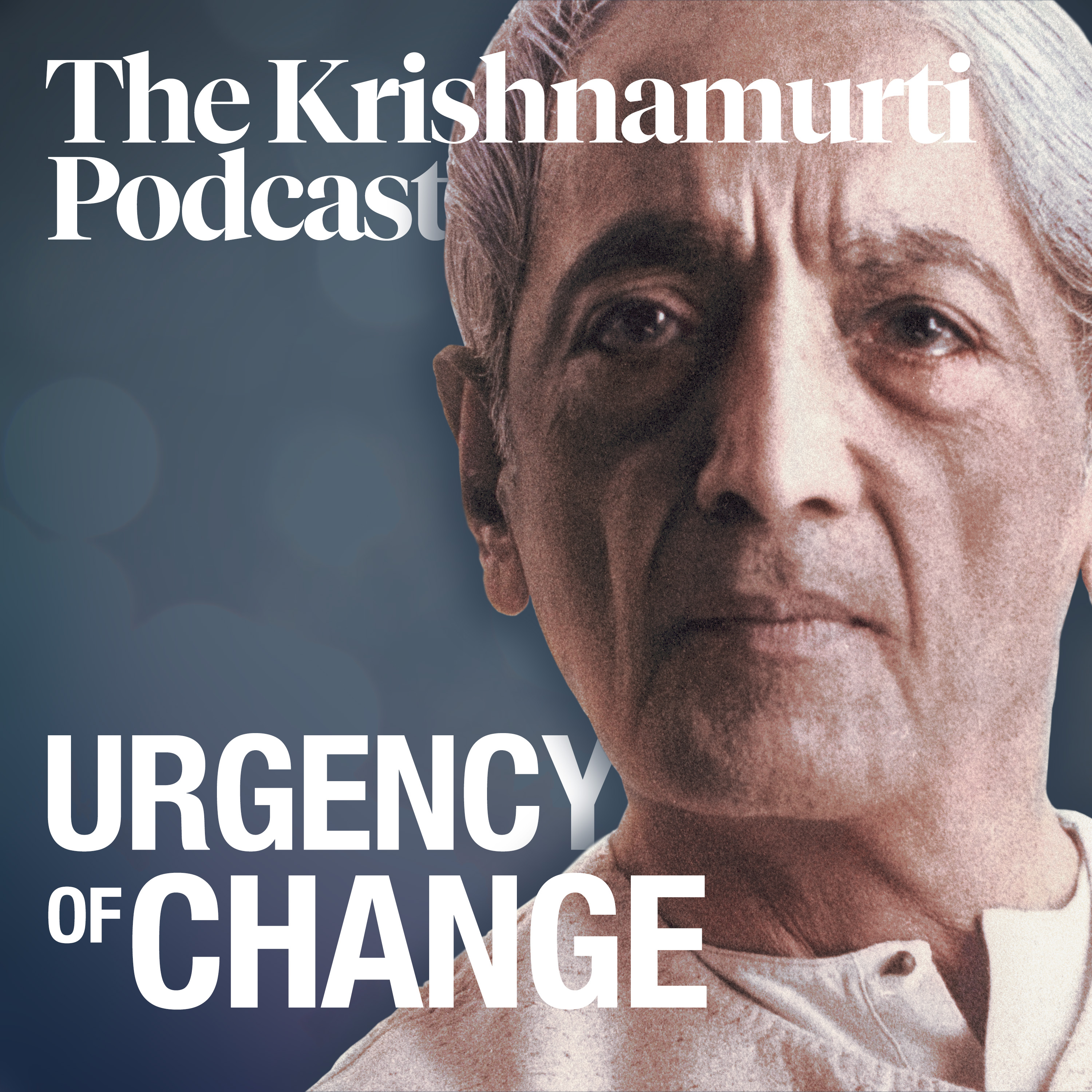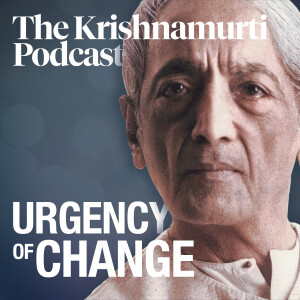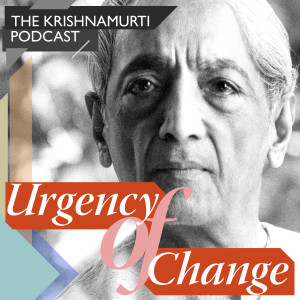
What are you doing with your life? Can anyone show you the way, or must you be a light to yourself? Do we see the urgency of change? One of the greatest spiritual teachers and philosophers of all time, J. Krishnamurti challenges us to question all that we know and discover our true nature in the here and now. This official podcast from Krishnamurti Foundation Trust now has over 250 episodes. Episodes 1-50 feature conversations between Krishnamurti and luminaries from many paths, along with readings of the classic book Commentaries on Living by actor Terence Stamp. Episode 51 onwards features carefully chosen extracts based on a theme explored by Krishnamurti. The extracts from our archives have been carefully selected to represent his different approaches to each of these universal and timelessly relevant themes. Get in touch at podcast@kfoundation.org. Please consider leaving a review, which helps the visibility of the podcast.
Episodes

Wednesday May 13, 2020
Krishnamurti with Asit Chandmal - Thought cannot investigate into intelligence
Wednesday May 13, 2020
Wednesday May 13, 2020
This conversation took place at Brockwood Park in 1982. Krishnamurti asks: Do you accept that intelligence is not the product of thought? What do you have you left when you don’t use the brain to inquire? What is not contaminated by thought? Can your brain observe something whole without any kind of fragmentation?
Krishnamurti and Asit Chandmal were friends for many years, and Krishnamurti would often stay with him when in Bombay. Chandmal studied engineering in London, where he later taught mathematical economics, before becoming finance director at Tata Motors. His interest in computing led to Chandmal’s involvement with many Silicon Valley start-ups. A trustee of the Krishnamurti Foundation India, he was also a keen photographer and in 1985 published the One Thousand Moons, a book of photographs illustrating a year in Krishnamurti’s life.
Find us online at kfoundation.org and on social media as Krishnamurti Foundation Trust

Wednesday May 06, 2020
Conversation with Pupul Jayakar 4 – Living with death
Wednesday May 06, 2020
Wednesday May 06, 2020
This conversation from 1981 between Krishnamurti and Pupul Jayakar looks at ending and death. What is ending? The mind cannot enter into a totally new dimension if there is a shadow of memory. If the movement of thought ends, consciousness as we know it is not. Thought is the enemy of compassion. What significance has death? Have we seen the meaning of death, the extraordinary beauty of ending something?
Pupul Jayakar, was a trustee of Krishnamurti Foundation India, and for decades was a friend of Krishnamurti’s. She helped publish many of his books in India, along with writing a biography which was published soon after his death. Her other books include The Earth Mother, The Buddha and God is Not a Full-Stop.
Find us online at kfoundation.org and on social media as Krishnamurti Foundation Trust

Wednesday Apr 29, 2020
Conversation with Pupul Jayakar 3 – On God
Wednesday Apr 29, 2020
Wednesday Apr 29, 2020
This conversation between Krishnamurti and Pupul Jayakar was recorded at Brockwood Park in 1981. Jayakar begins by asking if they can discuss and investigate into the nature of God. They go on to question whether we can negate completely the whole movement of knowledge – except the knowledge of driving a car, speaking a language, technological knowledge? Can one totally empty the whole accumulation of a million years? We never say, ‘I don’t know.’ That is an absolutely motionless state of mind, because I don’t know. One of our difficulties is that we all want to know; which means put what God is into the bag of knowledge. Can we have an insight into the movement of knowledge, so that the insight stops the movement? It’s not that we stop the movement or the brain stops the movement; the very insight is the ending of knowledge and the beginning of something entirely different. Is it possible to quieten thought completely? Is it possible to be free of the meditator? Then there is no problem. Then there is no question whether there is God or no God – because it doesn’t matter. Then meditation is the meditation of the universe.
Pupul Jayakar, who died in 1997, was an Indian cultural activist and writer, best known for her work on the revival of traditional and village arts, handlooms, and handicrafts. She was a close friend of prime minister Indira Gandhi, and was her cultural advisor and biographer. Having been to a school established by Annie Besant, Pupul became involved with Krishnamurti’s work in the 1940s, becoming a trustee of the Indian foundation.
Find us online at kfoundation.org and on social media as Krishnamurti Foundation Trust

Wednesday Apr 22, 2020
Interview by Wilfred Thomas
Wednesday Apr 22, 2020
Wednesday Apr 22, 2020
This interview by Wilfred Thomas with Krishnamurti took place at the recently-purchased Brockwood Park in Hampshire. It was recorded for Australian radio. Questions asked include: How old were you when you first heard the theosophists’ plans for you? When did you first have doubts about the pattern they had laid down for you? How are you reaching younger people? Do you think it is possible that humanity, instead of breaking up into national groups and races, will merge into one? What is your definition of love? What do you think happens when the body dies, reincarnation? You now have three institutions. Are they maintained by subscriptions? Wilfred Thomas lived in Australia and then London. He began his career as a singer and later moved on to presenting and acting for television and radio.
Find us online at kfoundation.org and on social media as Krishnamurti Foundation Trust

Wednesday Apr 15, 2020
Conversation with Donald Ingram Smith
Wednesday Apr 15, 2020
Wednesday Apr 15, 2020
This conversation between Krishnamurti and Donald Ingram Smith, entitled 'Awareness is a mirror in which the movement of thought is perceived', was recorded in Ojai, California in 1977. Krishnamurti asks whether all of consciousness is made up of its content. Can thought be aware of itself? Is whatever thought has created reality? Intelligence is not a product of thought. Thought has limited itself, made itself a fragment. Attention is the summation of all energy.
Donald Ingram Smith was a well-known Australian Broadcasting Corporation (ABC) broadcaster from Sydney. For many years he was involved with the recording of Krishnamurti’s talks in Australia and India. He also hosted a radio programme on Krishnamurti. Ingram Smith first met Krishnamurti in 1949 and his memoirs of the times he spent with Krishnamurti through to his death are published in the book Creative Happiness: A Journey with J. Krishnamurti.
Find us online at kfoundation.org and on social media as Krishnamurti Foundation Trust

Wednesday Apr 08, 2020
Conversation with David Bohm - A feeling for something sacred
Wednesday Apr 08, 2020
Wednesday Apr 08, 2020
David Bohm’s contact with Krishnamurti began in the early 60s and continued into the 80s. Their dialogues are far-reaching and profound. Over 30 audios and videos are available on our YouTube channel, and are published in the books Truth and Actuality, The Transformation of Man, and The Ending of Time.
Recorded in 1981 in Ojai, California, this conversation explores the sacred, with Krishnamurti saying that there is a sacred origin which gives one tremendous passion and energy. He asks: is anyone willing to totally abandon everything that thought has created, including the ‘me’? Is it possible to live a daily life in the modern world without any identification? How am I to educate myself to have no shocks of any kind? Only a brain free from shocks can find the origin. The brain must be always in a state of movement without identification, like a river. Then it cannot be shocked.
Find us online at kfoundation.org and on social media as Krishnamurti Foundation Trust

Wednesday Apr 01, 2020
Interview by Frank Waters
Wednesday Apr 01, 2020
Wednesday Apr 01, 2020
Frank Waters was a well-known American author based in New Mexico. His books include novels, biographies, histories, and essay collections. Known as the Grandfather of Southwestern Literature, he was nominated for the Nobel Prize several times.
His interview with Krishnamurti took place in Malibu, California in 1972. Subjects include: what brings about receptivity? Speaking to the unconscious; the little self and the big self; how Krishnamurti’s teachings work; myth; the destruction of the planet; sleep; and kundalini.
Find us online at kfoundation.org and on social media as Krishnamurti Foundation Trust

Wednesday Mar 25, 2020
Conversation with Alain Naude – Masters and hierarchy
Wednesday Mar 25, 2020
Wednesday Mar 25, 2020
Alain Naude was Krishnamurti’s private secretary in the 1960s. He met Krishnamurti in 1963 whilst a music lecturer at Pretoria University and a professional concert pianist. He gave up his teaching and performing in 1964 to work with Krishnamurti. Fluent in several languages, he was very helpful at international gatherings and in attracting younger audiences to Krishnamurti’s talks at a time of cultural change in the West.
This fourth conversation between Naude and Krishnamurti was recorded in January 1972. Naude begins by asking about masters. ‘One finds in various teachings the idea of masters, conscious entities who work for the good of mankind. Is there a reservoir of wisdom? Do such entities exist, or does man want to have myths?’
Krishnamurti responds that there is a reservoir of goodness and a reservoir of violence and asks whether there something which is not these two, that is beyond these two?
Is your mind capable of not being held in the reservoirs of goodness or violence?
When you understand these two opposites and go beyond them, meditation is not in terms of vision or action, but the state of silence which is then operating, an energy which then flows. That energy has no character.
When one asks, ‘Is there a hierarchy, a master, a group of evolved entities?’ you are asking from a point of view, or from desire, from hope.
What is the relationship between the current of vulgarity and that which is beyond and above the opposites?
Find us online at kfoundation.org and on social media as Krishnamurti Foundation Trust

Wednesday Mar 18, 2020
Conversation with Alain Naude – Is there a permanent ego?
Wednesday Mar 18, 2020
Wednesday Mar 18, 2020
Alain Naude was Krishnamurti’s private secretary in the 1960s. He met Krishnamurti in 1963 whilst a music lecturer at Pretoria University and a professional concert pianist. He gave up his teaching and performing in 1964 to work with Krishnamurti. Fluent in several languages, he was very helpful at international gatherings and in attracting younger audiences to Krishnamurti’s talks at a time of cultural change in the West.
This conversation with Krishnamurti was recorded in Malibu, California in 1972 and begins by asking whether there is a permanent ‘me’?
Unless I am free from the vulgar, I will continue representing the whole vulgarity of humanity.
I lead the usual life, along the small river, following that current. I am that current and ‘the me’ is bound to continue in that stream, with millions of others. I am not different from those millions of others.
When you say, ‘My brother is dead,’ and ask whether he is still living, as a separate consciousness, I question whether he was ever separate from the stream.
If there was a permanent self, it would be of this stream. Realising that I am like the rest of the world, that there is no ‘me’ separate, I can incarnate only if I step out of the stream.
Change takes place away from the stream; in the stream there is no change.
What happens if you step out of the stream? The stepping out is the incarnation.
When one steps out of the stream, one has compassion.
Find us online at kfoundation.org and on social media as Krishnamurti Foundation Trust

Wednesday Mar 11, 2020
Interview by Eric Robson
Wednesday Mar 11, 2020
Wednesday Mar 11, 2020
Eric Robson is a broadcaster, author and documentary film maker, based in the UK where he also farms. For 25 years he chaired Gardner’s Question Time.
This 1984 conversation was part of a television series he hosted, called Revelations. Questions Robson asks Krishnamurti include: Did you ever believe, as the people who were sponsoring you believed, that you were some sort of messiah? Can you explain why you are so positively against organised religion? Is your system rooted in any religion? How do you strip away conditioning? Is there only one truth or are there many truths? When you approach the pathless land of truth, do you have to do anything with that truth? Is it possible for everyone to achieve truth? You said that the world can only change through personal transformation, and yet the world is sliding to the edge of a black abyss. Won’t personal transformation simply come too late?
Find us online at kfoundation.org and on social media as Krishnamurti Foundation Trust
